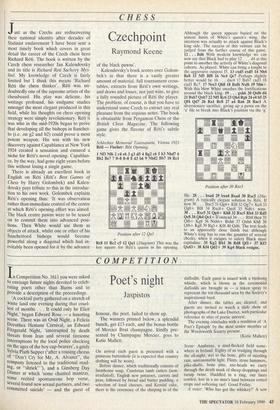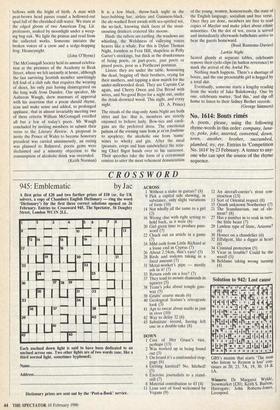COMPETITION
Poet's night
Jaspistos
In Competition No. 1611 you were asked to envisage future nights devoted to celeb- rating poets other than Burns and to provide a description of the proceedings.
'A cocktail party gathered oh a stretch of waste land one evening during that cruel- lest of months . . . It could only be Eliot Night,' began Edward Rose — a haunting scene. There was an Ovid Night, a Felicia Dorothea Hemans Carnival, an Edward Fitzgerald Night, 'interrupted by death threats from Iran and several tiresome Interruptions by the local police checking on the ages of the boy cup-bearers', a grisly Sylvia Plath Supper ('after a rousing chorus of "Don't Cry for Me, A. Alvarez", the company listened to the traditional read- ing, or "shriek" '), and a Ginsberg Day Dinner at which 'some chanted mantras, some recited spontaneous bop verse, several found new sexual partners, and two committed suicide' — and the guest of honour, the poet, failed to show up.
The winners printed below, a splendid bunch, get f13 each, and the bonus bottle of Mercier Brut champagne, kindly pre- sented by Champagne Mercier, goes to Katie Mallett.
On arrival each guest is presented with a primrose buttonhole (it is expected that country clothing will he worn).
Before dinner, which traditionally consists of farmhouse soup, Cumbrian lamb cutlets (non- irradiated), English new potatoes, carrots and peas, followed by bread and butter pudding, a selection of local cheeses, and Kendal cake, there is the ceremony of the chirping in of the daffodils. Each guest is issued with a birdsong whistle, which is blown as the ceremonial daffodils are brought in — a token spray to represent the ten thousand seen by the Society's inspirational bard.
After dinner, the tables are cleared, and guests are invited to watch a slide show of photographs of the Lake District, with particular reference to sites of poetic interest. The evening concludes with a rendition of 'A Poet's Epitaph' by the most senior member of the Wordsworth Society present.
(Katie Mallett)
Scene: Anabriste, a mud-flecked field some- where in Ireland. Eighty of us trudging through the all-night, wet to the hone, gifts of mizzling rain, unreasonable light. Flints, stone hammers, pike-shafts, bone pins, axe-heads we carry through the death mask of sheep droppings and turnip twine. Huddled in a ring, our faces cowled, lost in a no man's land between rotted crops and softening turf. Good Friday.
A voice: 'Who has got the whiskey?' A sow
bellows with the fright of birth. A man with peat-brown head passes round a hollowed-out spud full of the cherished still-water. We stare at the edged gloom of two American Eng. Lit. professors, soaked by moonlight under a weep- ing bog oak. We light the primus and read from the collected works. Someone imitates the broken voices of a crow and a sedge-hopping frog. Heaneynight.
(John O'Byrne) The McGonagall Society held its annual celebra- tion at the premises of the Academy in Beak Street, where we felt instantly at home, although the last surviving Scottish member unwittingly fell foul of a club rule that requires the wearing of shoes, his only pair having disintegrated on the long walk from Dundee. Our speaker, Mr Auberon Waugh, drew murmurs of approval with his assertion that a poem should rhyme, scan and make sense and added, to prolonged applause, that in almost invariably meeting two of these criteria William McGonagall excelled all but a few of today's poets. Mr Waugh concluded by inviting members to submit their verse to the Literary Review. A proposal to invite the Prince of Wales to become honorary president was carried unanimously, an outing was planned to Balmoral, poetic gems were declaimed and a minority objection to the consumption of alcoholic drink was overruled.
(Keith Norman) It is a low black, throw-back night in the beer-bobbing bar, airless and Guinness-black, the ale-washed floor awash with sea-spittled wit, the no-lack, knowing slack faces of the stout- snouting drinkers cratered like moons.
Hush: the rafters are rattling, the Windows are whistling, the Welshness of volleying voices heaves like a whale. For this is Dylan Thomas Night, formless as Fern Hill, shapeless as Polly Garter's stockings, but thick in the drunkenness of being poets, or part-poets, past poets or pissed poets, poor as a Porthcawl postman.
Listen: they are under the table, honouring the dead, begging off their brothers, crying for their mothers, and tapping a slow march for the under-milkwooded dead. They are Captain Cat again, and Cherry Owen and Dai Bread with wives, and No-good Boyo for a night out, under the drink-drowned wood. This night, and every night. (D. A. Prince) The rituals of the stag-only Amis Night are both strict and lax: that is, members are strictly enjoined to behave laxly. Bow-ties and cardi- gans are the preferred dress. The emotional pattern of the evening runs from je m'en foutisme to apoplexy; the alcoholic one from 'name' wines to whisky and gin. After the meal (peanuts, crisps and ham sandwiches) the retir- ing Chief Bigot hands over to his successor. Their speeches take the form of a ceremonial contest to utter the most vehement denunciation of the young, women, homosexuals, the state of the English language, socialism and free verse. Once they are done, members are free to read copies of Mayfair and make jokes about ethnic minorities. On the dot of ten, cocoa is served and immediately afterwards bathchairs arrive to bear the guests homeward.
(Basil Ransome-Davies) Larkin Night Seated glumly at separate tables, celebrants remove their cycle-clips (in hatless reverence) to mark the arrival of the Awful Pie.
Nothing much happens. There's a shortage of booze, and the one presentable girl is hogged by a total shit.
Eventually, someone starts. a lengthy reading from the works of Jake Balokowsky. One by one, celebrants mutter, 'Sod this,' and slip off home to listen to their Sidney Bechet records.
(George Simmers)



















































 Previous page
Previous page